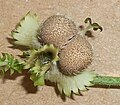Top Qs
Timeline
Chat
Perspective
Tragia durbanensis
Species of creeper From Wikipedia, the free encyclopedia
Remove ads
Tragia durbanensis, the stinging nettle creeper, is a twining herb in the family Euphorbiaceae,[1] with a restricted distribution in southern Africa.[2]
Remove ads
Distribution and habitat
It is native to the coastal areas of Mozambique and eastern coastal areas of South Africa.[1] These plants are found in dune forest,[3] in woodland and on forest margins.[1]
Description
A much-branched climbing perennial herb, with twining stems up to 2.5 m originating from a woody rootstock.[4] The leaves are hairless or thinly hairy with serrated margins.[1] The hairs sting fiercely.[1] Inflorescences are up to 5.5 cm long with peduncles up to 2 cm long.[4] The inflorescences are composed mostly of tiny[1] male flowers with 1–2 female flowers below or else all male.[4]
Remove ads
Synonyms
- Tragia capensis E.Mey. ex Sond. [Illegitimate name]
- Tragia glabrata (Müll.Arg.) Pax & K.Hoffm. [Illegitimate name]
- Tragia glabrata var. hispida Radcl.-Sm.
- Tragia meyeriana var. glabrata Müll.Arg.
Ecological significance
This species is one of the larval foodplants of four species of butterfly; Eurytela hiarbas, Eurytela dryope, Byblia ilithyia and Byblia anvatara.[5]
Gallery
- Female flower
- Fruit viewed from the side
- Fruit viewed from the front
References
Wikiwand - on
Seamless Wikipedia browsing. On steroids.
Remove ads





